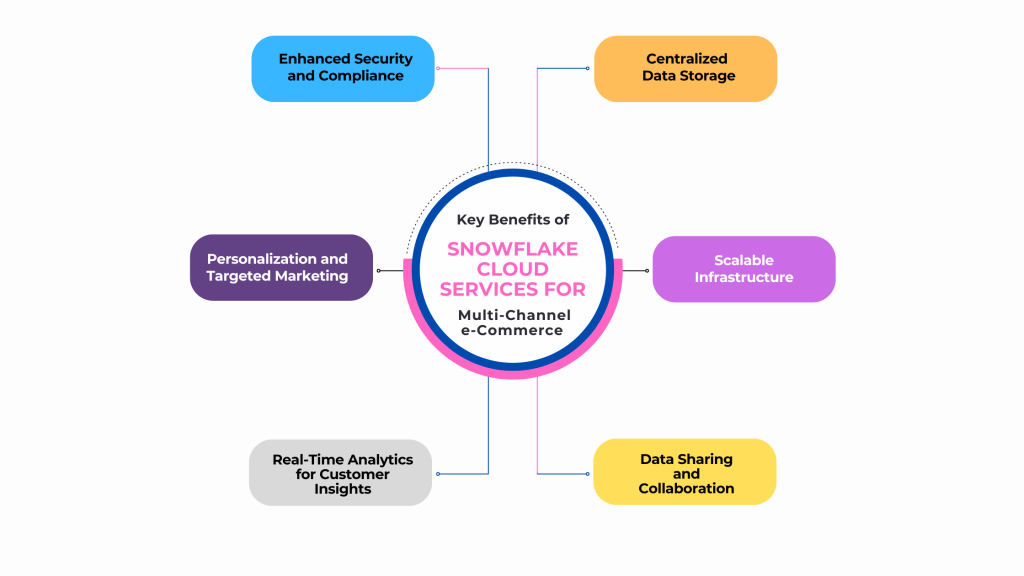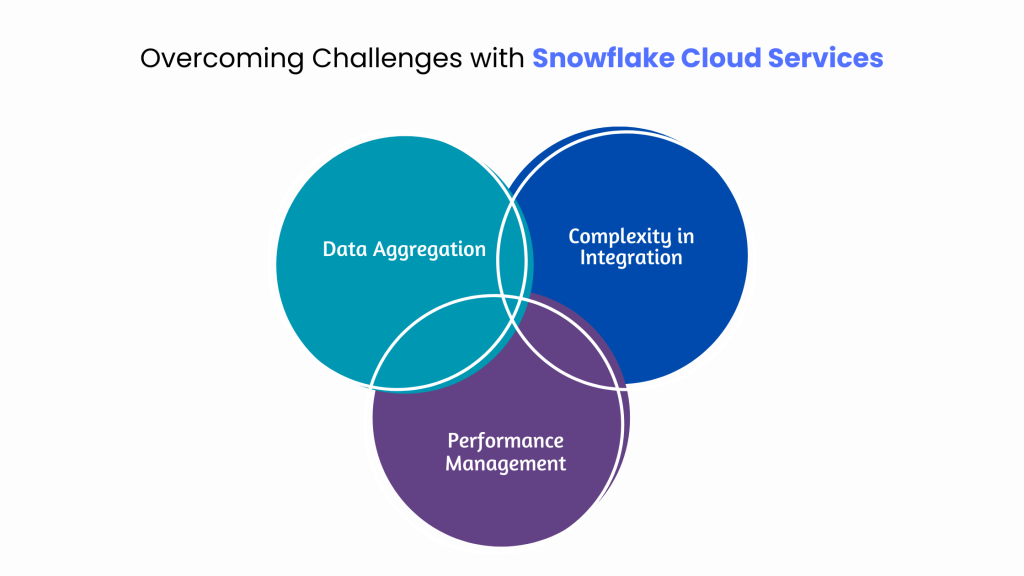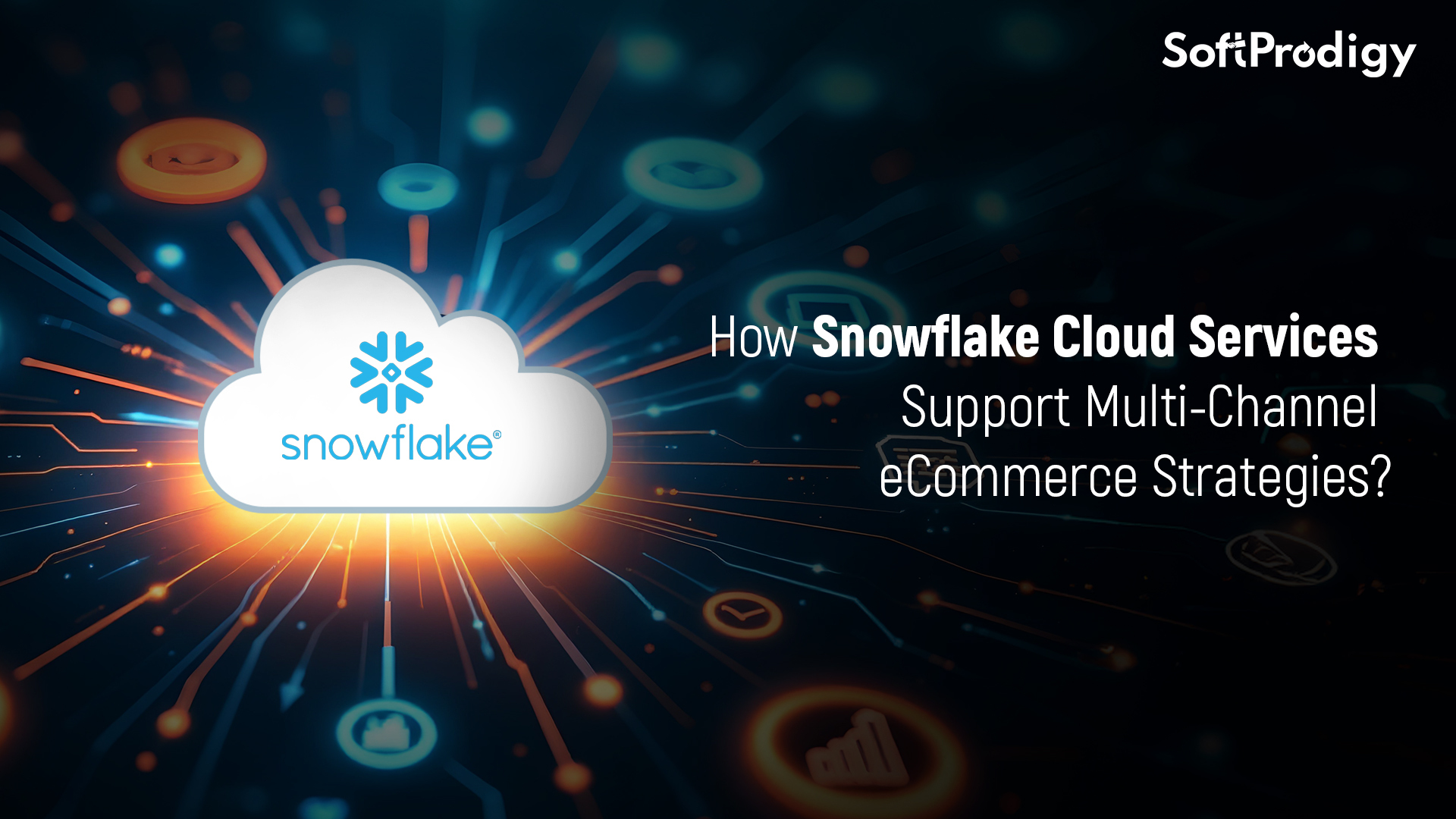Enterprises have adopted a number of strategies to get in touch with the audience on various platforms. These include marketplaces, physical stores, social media, websites, mobile apps, and more. Each platform provides distinct chances to businesses so that they can engage with the customers. Nevertheless, handling all of them effectively can leave you overwhelmed. Therefore, using Snowflake cloud services is your safest bet. Snowflake allows enterprises to handle large volumes of data generated by such platforms, allowing them to collect, identify, and act on customer insights in real time.
Businesses need not be concerned about data fragmentation across different sites in Snowflake. All the data that is collected is stored in a central place. Then, the collected information can be easily accessed and analyzed, helping in understanding customer behavior through an integrated view of complete information.
Again, they might be visiting the product, asking on social media, and making a final purchase on an internet page. Snowflake’s interaction trail will help offer a smooth, personalized user experience.
In addition, Snowflake’s flexible, cloud-based architecture allows businesses to easily adapt to data storage and processing requirements when there may be a huge traffic level, such as during a holiday shopping season. At the same time, this real-time analytics allows for data-driven decision-making right at the moment for eCommerce companies, enabling them to change their strategy according to the needs of customers, demand, or trends that might occur.
In short words, Snowflake cloud services help eCommerce businesses make themselves competitive and optimize multiple-channel strategies, which subsequently can be helpful in enabling better customer experiences.
What is Snowflake Cloud Services?
Snowflake Cloud Services is a platform to make data storage, management, and analysis easier in the cloud. Its architecture uses a multi-cluster shared data approach, in which it separates storage from computing power.
Separating storage from computing power is very advantageous because it means huge amounts of data can be stored without slowing down the processing speed or hitting a capacity limit. In other words, Snowflake lets companies scale up storage as necessary without affecting how fast their own analysis or processing of that data occurs.
Snowflake would be extremely useful for an organization having complex data requirements, such as an eCommerce company. It helps to manage large data from different sales channels: online stores, physical shops, and mobile apps.
Snowflake enables all of them to store all their data in one location, doing a sophisticated analysis on, for instance, customer behavior, stock quantity, and sales trend analysis. This implies that various teams can go ahead to operate on this data in place without halting each other’s functioning.
Overall, Snowflake’s architecture provides firms with the option to store their data in cloud architectures quickly and flexibly, while offering great scale and speed in achieving results.
Why Multi-Channel Strategies Are Vital for eCommerce Success?
A multi-channel strategy allows the online stores to reach their customers on many different fronts while giving them an integrated, easy shopping experience. A good example could be when a customer visits products on the mobile app and then continues to research and compare prices online before buying it in-store. Multi-channel strategies would ensure every point is interconnected, delivering service with consistent quality as customers engage with the company across multiple fronts.
But the task of dealing with many channels is not so easy. It requires advanced data integration for the purpose of tracing and unifying activities in various customer interactions on multiple platforms, and real-time analytics for the better understanding of the behavior of the customer.
The cloud-based data platform by Snowflake allows easy integration and management of vast data coming from diverse channels in a way that they can be easily accessed from one central system. Real-time analytics provided by it allows business firms to trace all kinds of interactions between the customer and business on every single platform instantaneously.
Snowflake will assist companies in understanding each individual customer so that eCommerce brands can deliver an experience that becomes personalized and more consistent by channel. That support earns Snowflake a place at the top of the leaderboard among eCommerce brands looking for seamless, data-driven experiences on every channel.
Key Benefits of Snowflake Cloud Services for Multi-Channel eCommerce

There are a number of advantages businesses can enjoy through Snowflake cloud services. Here are some of them:
• Centralized Data Storage:
Snowflake is able to centralize all of a company’s data in one location. This is very important for eCommerce companies, whose data might be coming in from a sales platform, website traffic, social media, customer service, and so much more. Centralized data through Snowflake develops a single view of each customer and delivers the information required to offer personalized, consistent experiences across every channel.
• Scalable Infrastructure:
With peaks coming from holidays or special promotions, eCommerce traffic is unpredictable. A business can scale the needed data management up or down in Snowflake’s cloud-based structure, accommodating spikes in volume as it occurs-on Black Friday or during other holiday shopping events, without degrading performance.
• Data Sharing and Collaboration:
The data sharing feature in Snowflake makes it possible for eCommerce companies to share data securely with various partners, suppliers, as well as other teams within the company. For example, marketers and sales teams can coordinate campaigns on shared customer information across different channels.
• Real-Time Analytics for Customer Insights:
One of the biggest advantages Snowflake has is real-time analytics for customer insights. Any multi-channel eCommerce company will pay more for up-to-the-minute data on customer behavior, inventory levels, and sales trends than for all the money in the world. Businesses can make fast decisions based on data-even change campaigns or stock levels according to real-time customer preferences and trends.
• Personalization and Targeted Marketing:
Snowflake’s strong analytics strength enables personalization at every touchpoint. From here, businesses can derive personalized product recommendations, offers, and content for their customers based on customer behavior data. These opportunities to enhance customer experience will rise with it. Therefore, this further strengthens customer loyalty and enhances sales through personalization powered by data capabilities of Snowflake.
• Enhanced Security and Compliance:
The eCommerce companies process sensitive customer information, so data security is one of the top concerns. It ensures data security through encrypted data, safe data sharing, and even compliance with industry standards such as GDPR. This level of security supports eCommerce businesses in achieving customer trust in all their channels.
How Snowflake Supports Specific Multi-Channel eCommerce Needs?
Whether you are a startup or an established company, here is how Snowflake supports certain multi-channel eCommerce requirements:
• Managing Inventory Across Channels
The inventory needs to remain consistent across all the different channels of sales in order to avoid overstocking or a stock out. Snowflake allows businesses to connect and integrate inventory data from any number of sources, creating a real-time view of inventory levels. This provides online retailers with the necessary control over their supply chain, such that products are available both at the right time and place for customers.
• Optimizing Marketing Campaigns
The use of multi-channel eCommerce is mainly dependent on targeted marketing for the attraction and retention of customers. In turn, with Snowflake analytics capabilities, businesses will have an opportunity to determine what strategies are working for a given campaign on any of these channels and concentrate resources on that which is working best. A company can determine the type of social media platform or email campaigns that have the most conversion rates and spend money there.
• Enhancing Customer Support
Customer service would become part of a multichannel strategy, with Snowflake enabling companies running an eCommerce business to centralize data regarding each customer. This is important so that the support team can readily access it to give more accurate and efficient service. And with a complete view of each customer’s history and preferences, support representatives would be able to deal with issues much faster, making customers happy in the long run.
• Leveraging AI and Machine Learning for Predictive Insights
Snowflake supports a host of AI and machine learning tools, which form the essence of predictive analytics in eCommerce. It can run through machine learning models, predicting buying patterns or giving recommendations, fraudulent transactions and more. The availability of such data capabilities on Snowflake allows integration and use of the advanced analytics tools easily, which would support multi-channel strategies even further.
Overcoming Challenges with Snowflake Cloud Services

While multi-channel strategies bring various benefits, they cause problems like data fragmentation and make the integration complex while controlling performance. Snowflake addresses all these problems as well:
• Data Aggregation:
Since there are multiple sources for data, the likelihood of data silos on an eCommerce firm’s end is high. Data aggregation allows Snowflake to have all data in one location, accessible via a single platform. Data fragmentation goes out the window as it empowers businesses to make more cohesive, solid business decisions.
• Complexity in Integration:
The integration of data originating from various channels is complex when the data differs in formats and systems. Snowflake offers integration with third party tools in abundance, meaning that all data coming into channels can be unified for processing. This flexibility does simplify integration and reduces the technical obstacles.
• Performance Management:
eCommerce data processing needs can be quite different from one another. At peak holidays, it requires companies to process many millions of rows in constant flow without taking a beat. The multi-cluster architecture of Snowflake provides smooth performance scaling, ensuring that data remains available, and analysis speeds are maintained even in high-demand periods.
The Future of Multi-Channel eCommerce with Snowflake
Multi-channel strategies are increasingly becoming the most important because, in eCommerce, they are booming. Customers nowadays shop across websites, mobile applications, and physical stores and are also coming up with new channels.
Some of the latest examples would be social commerce – in which one browses and buys directly on the platform of social media. Then comes the metaverse, where virtual stores and experiences are taking shape. The firms would require advanced tools for real-time management, analysis, and integration of data across different varied platforms.
Snowflake uniquely stands to support this future of multi-channel eCommerce. It has been designed with flexibility and scalability, thus the current and future channels data will be treated right to create one centralized location to ensure that data is kept and maintained.
The architecture of Snowflake separates storage from computing, meaning that a company can have its data, however voluminous it is, yet scale up the power of computation. This also allows them to handle millions of data files at a single time without crashing, whether at peak shopping times or adding new channels.
It also enables the eCommerce companies to compete because it is an adaptive innovation platform. Snowflake ensures that the data updates with every new requirement. Over time, the technology has been changing with new trends, and keeping up with it has enabled Snowflake to stay compatible with new trends. This ability to adapt has ensured that companies continue relying on Snowflake for long-term data solutions.
Conclusion
Snowflake helps the multi-channel eCommerce strategy in transforming with great powers on data management and scalable architecture, real-time analytics, and much more. Thus, Snowflake gives all eCommerce businesses an edge on making personalized, seamless customer experiences which keep customers returning over and over again. In order to overcome the complexity that the multi-channel creates with such operations, snowflake provides tools like inventory management.
By investing in Snowflake cloud services with SoftProdigy, eCommerce businesses will not only streamline current operations but also set themselves up for success in the future of multi-channel retail. As a registered partner with Snowflake, SoftProdigy provides specialized expertise and solutions that are tailored to meet the unique needs of online retailers.
FAQs
What is Snowflake, and how does it help eCommerce?
Snowflake is a cloud-based data platform that makes easy storage, management, and analysis of data for an eCommerce business. It supports various sales channels like websites, apps, and stores, all in one place.
How does Snowflake improve multi-channel eCommerce?
Snowflake allows multi-channel eCommerce brands to maintain data in real time coming from various channels. The brands will, therefore, be able to see what happens with customers on websites, apps, and stores.
Why is data integration a must for multi-channel eCommerce?
Data integration is where all sales channels’ information is combined. Snowflake does make it easy to get data integrated so that these eCommerce businesses can get every customer interaction so that one can provide better service.
Can Snowflake help to do real-time analytics?
Snowflake is real-time; so companies can see it immediately and respond to it through all channels. Companies have more improved customer experience.
How does Snowflake manage big data?
Actually, the scalable architecture of Snowflake allows separation between storage and processing. There is an ability to have unlimited data storage and computing power to achieve continuous running.
Does Snowflake work with new sales channels like social commerce?
Absolutely. Snowflake is elastic and supports data coming in from new channels such as social media and the metaverse, which enable ecommerce companies to update quickly with changing trends.
How does Snowflake help me become more competitive at eCommerce?
Snowflake can help companies understand what their customers need by processing data in an efficient and analytical manner, enabling businesses to offer faster, smarter services across all channels.











